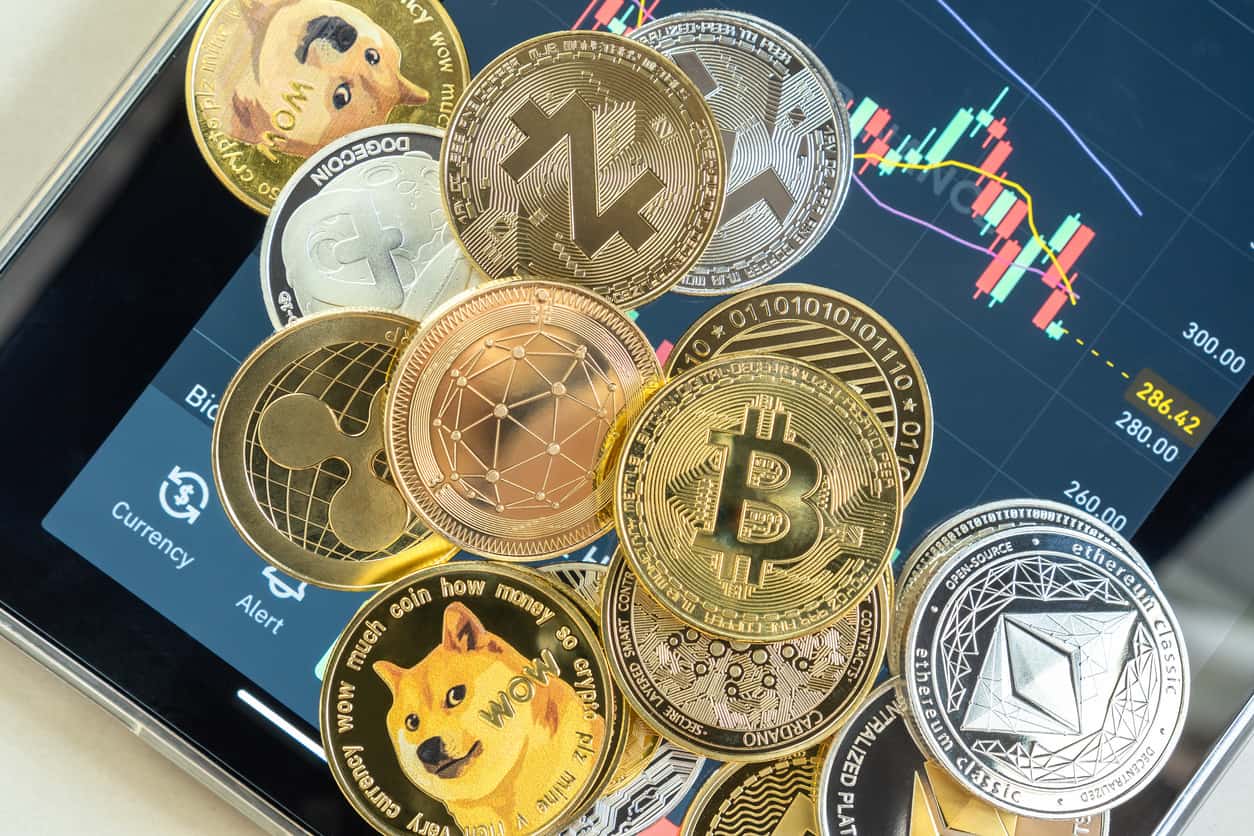
The global cryptocurrency market was estimated at $1.3bn in 2021, with the industry projected to grow at a compound annual growth rate (CAGR) of 12.2% to $2.8bn by the end of 2028, according to BlueWeave Consulting, a strategic consulting and market research firm. The evolution of digital assets, the progress in technical development, and the growing acceptance of the newest asset class have led to its popularity.
Coming to the Indian markets, despite the government’s aggressive stance on digital assets, investments in cryptocurrencies are intensifying rapidly. Crypto trading in India is legal, though the markets are unregulated, as is the case with contract for difference (CFD) trading.
While profits are the primary motive for the widespread interest among the country’s younger population, the other reasons could be low internet costs, mounting real estate prices, and a surge in the tax rates on precious metals such as gold and silver. Besides, the intuitive, user-friendly interface and the 24/7 markets have given investors unparalleled leeway to grow their portfolios.
In a survey on the growth of the blockchain industry in India by KuCoin, an estimated 115 million people, aged between 18 and 60, either hold or have traded digital currencies over the six months to June 2022. While this accounts for about 15% of the Indian population, the global crypto exchange also acknowledged that a further 10% are curious about investing in digital assets over the next six months.
What Is Crypto Trading?
Cryptocurrency trading is the process of buying and selling digital currencies via a CFD broker, a crypto broker, or a dedicated exchange. Crypto trading can be carried out in multiple ways. One method is to speculate on the price movement of these virtual currencies by signing up with a CFD broker. The other is to choose a traditional or online broker that enables you to buy and sell cryptos, and their derivatives, in addition to other financial assets such as equities, commodities, Treasurys, and others. The third is to choose a dedicated cryptocurrency exchange that offers the choice of hundreds of digital currencies, with the option to store wallets and more.

So, the first step before you can begin trading cryptos is to compare the platforms between brokers and dedicated cryptocurrency exchanges, the different digital assets they offer, security features, fees, withdrawal options and storage methods.
Once you’ve selected the platform, go ahead and fund your account. Most brokers and exchanges allow clients to use fiat currencies such as the US dollar, pound sterling, euro, Indian rupee, and others to purchase cryptos. A few also accept wire and ACH transfers.
The third step is to start trading via the trading app or the online platform provided by your broker or the cryptocurrency exchange. The features of your crypto trading app would depend on the broker or the exchange you have signed up with, and would generally include most components required for a trader to analyse the markets and execute trades seamlessly.
Is Crypto Trading Legal in India?
Trading cryptocurrencies via a CFD, cryptocurrency broker or dedicated exchange is totally legal in India. However, unlike the UK, where CFD brokers, crypto assets and exchanges come under the Financial Conduct Authority (FCA) regulations, the stringent supervisory framework does not exist in India. Besides, while some countries allow cryptos to be used to buy goods and services, the Reserve Bank of India has made it very clear that these digital assets cannot be used as legal tender as the central bank does not issue them.
However, the good news is that India is an active member of the Financial Supervisory Board (FSB), an international body working to put together legislation on cross-border cryptocurrency transactions. According to government sources, the country will formulate legislation to address the vulnerabilities of crypto trading by implementing a solid regulatory and supervisory policy to ensure robust financial stability after the FSB delivers its report.
Who Regulates Crypto Trading in India?
The Securities and Exchange Board of India (SEBI) governs the country’s financial markets. However, when it comes to cryptocurrencies, they are categorised as Virtual Digital Assets (VDA) and are primarily unregulated, as in most countries worldwide. In its 2022 annual budget, the Indian government announced a 30% tax on profits from cryptocurrency assets besides a 1% Tax Deducted at Source (TDS). The government believes that until it forms a legal framework to address the many concerns of these OTC markets, it will continue to tax profits.
On the other hand, under section 115BBH of the Income-tax Act 1961, cryptocurrency losses cannot be offset against profits made from transacting in other virtual currencies. In addition, the losses in cryptocurrency trading cannot be offset against your other taxable income.
For instance, if you earned a profit of ₹100,000 from Bitcoin but lost ₹50,000 in Ethereum, you are still liable to pay a 30% income tax plus 1% TDS on the ₹100,000 profits earned from selling Bitcoin. You cannot offset your Ethereum losses against your Bitcoin profits.
How to Choose a Safe Crypto Broker in India
Irrespective of the asset class, the biggest challenge for investors trading on the OTC markets is choosing a safe broker.
As mentioned earlier, cryptocurrency trading is legal but largely unregulated in India. So, investors should be 100% sure that the crypto broker they choose is not a scammer claiming to be a regulated entity.

There are several factors to consider when searching for a safe crypto broker in India. Here are some of them.
The first is the jurisdiction where the broker operates and if it services Indian clients.
The next most important factor is the security offered by the crypto broker or exchange. Although none are 100% secure, choose the broker or exchange that has been operating for a long time, has a solid client base, and has no major issues.
Thirdly, the broker should have sufficient clients to drive liquidity into crypto assets. Higher volumes ensure lower spreads and speedier entry/exit.
The fourth is the choice of assets. There are thousands of digital currencies in the market, and it’s impossible to offer all of them. So, if you would like to trade or invest in specific cryptos, check if the broker provides them before signing up.
The fifth is the fees charged by the broker or the exchange in addition to the regular spread. These could include trading fees, deposits/withdrawal costs, currency conversion costs, etc.
The sixth is the leverage offered. Crypto investors are probably exchanging fiat currency for digital ones or one crypto for another. However, CFD brokers and some crypto and traditional exchanges, such as the Chicago Mercantile Exchange (CME), permit derivatives trading, including futures and options.
The seventh factor to consider is the deposit/withdrawal limits. Brokers generally do not have a minimum deposit requirement. However, they might limit the amount you can withdraw each day.
The next is the quality of customer support, which is very important if you need to reach out to a broker with any issues you might run into that could affect your trading activity. Cryptocurrencies are very volatile, so it’s imperative for brokers to have robust customer support in place.
The Safest Crypto Brokers in India
Cryptocurrencies are easily categorised as the most volatile asset class, so choosing a safe crypto broker in India should be an investor’s primary objective. If you’re new to crypto trading and are unsure how to select the best crypto broker or the most robust trading app, we have listed some of the factors you should consider about your broker under the previous heading. You can also go through the top crypto brokers’ websites, read their clients’ reviews, speak to their support staff, check out their trading platforms/apps, etc.
Hundreds of crypto brokers operate in India, so it could be challenging to research them all. However, you can start by going through the best cryptocurrency brokers in India that we have exclusively selected for you after conducting thorough research.
| Broker | Features | Min Deposit | EURUSD Spread | ||
|---|---|---|---|---|---|
 51% of retail CFD accounts lose money
US Clients: No Regulated : Yes 51% of retail CFD accounts lose money
US Clients: No Regulated : Yes
|
|
$50 (varying by Country) | from 1 |
Sign
Up
*Don’t invest unless you’re prepared to lose all the money you invest. This is a high-risk investment and you should not expect to be protected if something goes wrong. Take 2 mins to learn more
|
|
 Your capital is at risk
US Clients: No Regulated : Yes Your capital is at risk
US Clients: No Regulated : Yes
|
|
$500 | From 0.6 pips | ||
|
|
|||||
Summary
Revenue in the global cryptocurrency segment is expected to reach $34.72bn, with a CAGR of 16.43% from 2022 to 2027, data from Statista showed. According to the German market and consumer data company, in terms of volumes, India is the second biggest cryptocurrency market in 2022, after the US, with Japan, the UK and South Korea coming in at 3, 4 and 5. Despite the Indian government and the central bank’s debatable stance on virtual assets, India is one of the biggest global markets for cryptocurrency trading. Several factors, such as low infrastructure costs, escalating prices of real estate, surging inflation, and high tax rates on precious metals, have driven investors into cryptocurrencies, but the industry faces several challenges from an unsupportive government.
However, looking at the positives, the newest asset class has led to the formation of several domestic exchanges and brokers dedicated to the crypto industry. In addition, the 24/7 markets, easy-to-use interface, low trading fees, zero to low annual maintenance charges, and potentially unlimited returns on investment are drawing investors to the world of virtual currencies. With a population of over 1.4 billion, the Indian crypto markets could just be getting started.